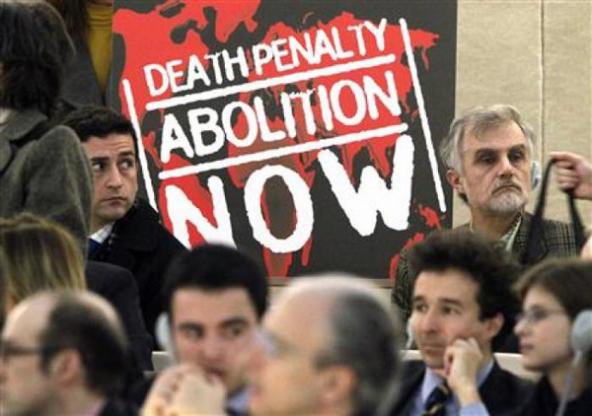
A challenge to the abolitionist movement
Abolition
Over the last few decades, we have made great strides toward the universal abolition of the death penalty. Nevertheless, despite the progress we have made, the death penalty remains entrenched in a significant number of states. And even in those nations that have refrained from carrying out executions in a sort of de facto moratorium, courts continue to sentence vast numbers of individuals to death. In this rather lengthy blog, I’d like to address what I see as the limitations of international law and the shortcomings of the international abolitionist movement in the face of these challenges. I should hasten to add that I am a steadfast believer in the potential for international law to influence the behavior of states that retain the death penalty. Nevertheless, there is a significant gap between existing international norms with regard to the death penalty, and the actual practice of states ostensibly bound by those norms.
First, there is an enforcement gap. The Achilles heel of the international legal regime is the lack of an adequate enforcement mechanism to ensure that nations live up to their international legal commitments. Our ability to enforce international human rights obligations in many parts of the world depends on the willingness of nations to adhere to their international obligations in good faith, as well as their self-interest in maintaining good relations with other actors in the international community. But the threat of international opprobrium is often an insufficient incentive for powerful nations such as the United States or China. A good case in point is the United States’ refusal to comply with the Avena judgment of the International Court of Justice, in which the ICJ held that the United States had violated its obligations under the Vienna Convention on Consular Relations in the cases of 51 Mexican nationals on death row in the U.S. As a remedy for those violations, the ICJ held that United States courts must review and reconsider the convictions and sentences of the Mexican nationals affected by the judgment in order to determine whether, and how, each was harmed by the violation of his consular rights. The judgment is unquestionably binding under the UN Charter, the ICJ Statute, and the Optional Protocol to the Vienna Convention on Consular Relations. But although both Republican and Democratic presidents have sought to enforce the ruling, they have been thwarted by the U.S. Supreme Court, which held in 2008 that the Avena judgment was not automatically enforceable in domestic courts in the absence of legislation. That means that if the U.S. is to comply with Avena, Congress must pass legislation to implement the judgment. The problem is that Congress is a political body, and conservative, anti-internationalist politicians have little interest in passing a law that enforces an international judgment benefitting foreign nationals who were convicted of heinous murders. Unsurprisingly, Congress has failed to enact legislation, and as a result two Mexican nationals—José Medellín and Humberto Leal García—have been executed in violation of the ICJ’s judgment.
Second, there is an information gap. The information gap leads to mistaken assumptions about the extent of the progress we are making on the ground toward worldwide abolition. I’ll give you two examples. The first pertains to the abolition of the death penalty for individuals with mental retardation. In 2002, the European Union filed an amicus curiae brief in the U.S. Supreme Court in support of Ernest McCarver, a mentally retarded man facing execution in Virginia. The EU argued that the United States was [quote] “one of the last remaining nations on the world” [end quote] executing mentally retarded persons. This argument was ultimately accepted by the Supreme Court, which concluded that the execution of individuals with intellectual disabilities constituted cruel and unusual punishment.
While I believe that most nations do not intentionally execute individuals with mental retardation, we have little data to support or refute that assertion. The vast majority of retentionist states have no laws that prohibit the execution of individuals with mental disabilities. Although most have laws providing that offenders who suffer from severe forms of mental illness cannot be found criminally responsible for their acts – something that is commonly referred to as the “insanity defense”—they have no laws or regulations to ensure that individuals with mental disabilities are not executed. Moreover, there is no universally applicable definition of mental illness or mental retardation, and most retentionist states simply do not have the means to ascertain, with any degree of certainty, whether an individual suffers from a mental disability. In many parts of Africa, for example, trained mental health experts are exceedingly rare, so mental health assessments are frequently conducted by nurses or other staff who lack formal training.
Another example is the abolition of the mandatory death penalty. While the abolitionist community has celebrated legal decisions striking down the mandatory death penalty, it has paid little attention to the implementation of those decisions. In Malawi, for example, the High Court struck down the mandatory death penalty in 2007. Yet, in the last four years, not a single man or woman who was given a mandatory death sentence has been granted a new sentencing hearing.
A third liability of the international abolitionist movement arises from its focus on abolition at the expense of reform. It is understandable that the international community would seek the holy grail of abolition, particularly in countries that are moving quickly in that direction. But in many other states, abolition will take time. In those states, a single-minded focus on abolition often forecloses careful examination of systemic failures in the criminal justice system that could be effectively addressed through concerted international pressure.
The most important of these systemic failures involves the lack of quality legal representation for individuals facing the death penalty. Inadequate legal representation, more than any other factor, is what determines who ends up on death row. The risk that innocent individuals will be condemned to death rises sharply in nations that have inadequate resources for legal aid. Yet in many retentionist states, individuals languish for years in pretrial detention without access to lawyers. Many of those accused of capital crimes will not meet their lawyers until the day their trial begins – too late to investigate and present evidence that could lead to their exoneration.
The challenges that I’ve described today are difficult and complex. So how can they best be addressed? As a first step, the international community should adopt a new set of principles relating to the application of the death penalty. The UN Safeguards Guaranteeing Protection of the Rights of Those Facing the Death Penalty were adopted in 1984, and they are outdated and overly vague. We need to develop instruments that reinforce the limits on how the death penalty can be applied in practice. Second, donors must fund comprehensive studies on the implementation of the death penalty in countries around the world so that the abolitionist movement has the necessary data to make intelligent strategic decisions about reform efforts. Third, the international community should devote more resources to the development and training of legal aid lawyers around the world, because they are the first guardians of the rights of those facing the death penalty. Through these measures, we can drastically reduce the numbers of individuals who face execution around the world, and ultimately save the lives of countless prisoners. This is not to say that the abolitionist community should abandon their efforts to engage political leaders on the question of abolition. These strategies are complementary, not mutually exclusive. But we simply cannot ignore the 17,000 prisoners already on death rows, and the thousands who will ultimately face execution after trials that fall far short of international standards of due process.







